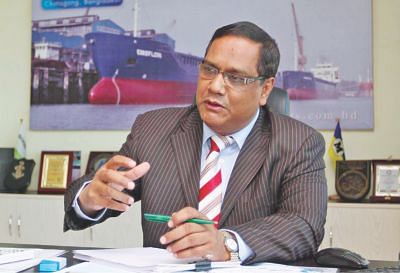Shipbuilding prospects shine bright

The government should prohibit import of second-hand ships and give more incentives and policy supports to local shipbuilders, said an official of a leading shipbuilding company of Bangladesh.
The government can also help the emerging sector by reducing cost of fund, which he said is 18 percent in Bangladesh compared to only 7 percent in China, for example.
This blunts their competitive edge over the foreign manufacturers, said Md Sakhawat Hossain, the managing director of Western Marine Shipyard Ltd.
Hossain sat with The Daily Star in an interview recently.
They started their operations in 2000 as a small entity when a group of mostly marine professionals felt the sector could grow in Bangladesh, as China, Japan and Korea had grown with shipbuilding being the backbone of their economy.
Making a humble beginning with only 200 employees, the company has now grown to generate employment for 3,500 people.
Hossain also said the turnover of the company for the year that ended on June 30, 2012 was Tk 370 crore raking a profit of Tk 40 crore.
“We also thought that Bangladesh is a riverine country but there are too many river accidents because of outdated ships being used to carry passengers. This prompted us to go into this business to offer a safer mode of river transport.â€
When asked about their biggest success so far, Hossain said they have supplied eight specialised multi-purpose cargo vessels to Germany.
The ships are of international standards in terms of technicality and are now plying in the Baltic Sea.
“We have also built two ferries for Denmark, one of them being a passenger ferry, which is a 2013 model with the latest technologies."
He also said this passenger ferry is for use by people going on holidays with facility to carry 32 motor vehicles. These vessels have been delivered just during the last few days.
Speaking about the challenges in Bangladesh economy and how the domestic shipbuilders can help in tackling these, he said there are three challenges -- power, traffic and environment.
He said ships are required to carry imported oil after refining in Chittagong to various power plants in the country.
Instead of importing second-hand tanker vessels, these are now being built in Bangladesh and these ships are environment-friendly 'double-hull' vessels ensuring no spillage of oil.
In order to minimise the pressure on the highways, through which imported containers are now being carried, the government has adopted a policy to carry the cargoes from Chittagong to Dhaka by container ships.
Licences have also been awarded to various companies including Western Marine to build 32 ships.
Hossain said each of these ships can carry 150 containers, and once this project is complete, it will ease the pressure on the highways significantly. His company has plans to build at least six such vessels.
The official said the government has taken a project for dredging the rivers as the main problem is that the rivers are not flowing properly because of siltation. The government has decided to build various types of dredging vessels for this purpose. "The good news is that all these vessels can be built in Bangladesh," he said, adding that foreign manufacturers are now coming to Bangladesh and entering into joint ventures with local companies.
About building passenger ships for inland transport, Hossain said Western Marine is the first company to connect the mainland with St Martin's Island by a passenger ferry.
The company has since then built more than 10 passenger ferries. He also said, to attract tourists from both abroad and from within the country, the company has started building cruise vessels and has already built four such vessels.
On new investment and expansion plans, he said, “We are focusing to catch the market of 2015 when we shall hear more about environment-friendly ships.â€
Ships of the future will be emitting very little toxic elements into the atmosphere and the machineries and technologies would have to be changed, he said.
From 2015, ships would be built to be run by liquified natural gas in order to reduce carbon and other toxic gas emission.
“We are now capable of building 10,000-tonne ships and would like to increase the capacity to 15,000 tonnes.â€
He said his company now holds 35 percent of the domestic market and about 30 percent of the foreign market of shipbuilding in Bangladesh.
The four pillars on which their company stands are quality, timely delivery, joint venture and corporate social responsibility, he said.
The company has established a 'primary health care centre' in the shipyard for health care of the employees.
Hossain also said, apart from the families of the employees, about 26,000 people in the catchment areas, especially women and children, get services from this health care centre. Food and education are also provided for the workforce, he added.
He also said the successful implementation of the four pillars of the company gives them an edge over their competitors.
The future of shipbuilding in Bangladesh is bright, the official said, adding that the demand in the domestic market is quite high.
Hossain said they have plans to build world-class cruise ships with a capacity to carry more than 2,000 passengers from Dhaka to Barisal and Patuakhali, and two such ships would be built by 2015.
He said they dream of a 'green ship', which he describes as leaving a legacy for an environment-friendly ship for the country.

 For all latest news, follow The Daily Star's Google News channel.
For all latest news, follow The Daily Star's Google News channel. 




Comments